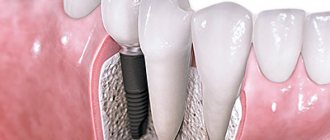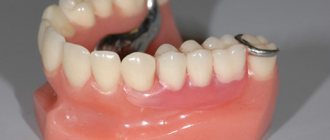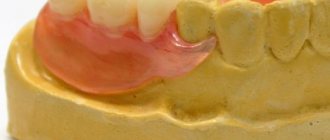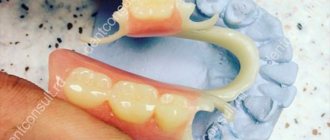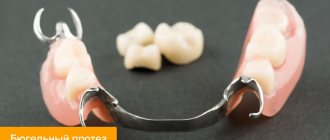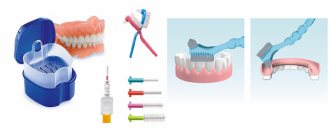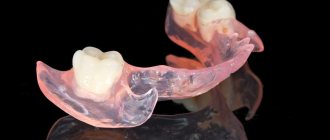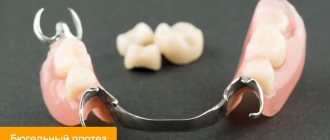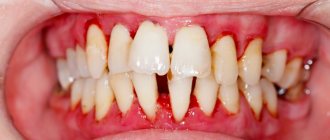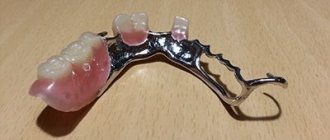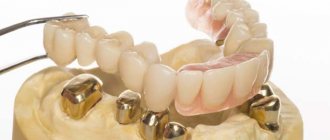Caring for dentures
- Types of structures
- Plastic dentures
- How to care at home
- How to care and store
- Nylon dentures
- Clasp dentures
- Care products
Dentures require careful care.
In order for them to serve their owners for a long time, you need to learn how to carefully care for them and store them correctly. Their insufficient cleaning and non-compliance with hygiene rules often cause destruction of neighboring teeth, inflammation of the gums, and bad breath. It is also important to listen to the recommendations of the doctor, who, when installing such structures, should tell the patient how to use them correctly. Dentures will retain their original appearance for a long time, provided:
- choosing the right cleaning product;
- maintaining daily oral hygiene;
- Visit the dentist at least twice a year for professional cleaning.
The main task of people who wear such designs is to maintain their aesthetics and durability. This can only be achieved if denture care is carried out in accordance with their type.
Features of clasp prosthetics
Clasp dentures are fundamentally different from plate dentures (acrylic, Acri-Free, nylon).
The design provides:
- The metal frame is a clasp (or arc translated from German), which unites all structural elements.
- A plastic base with a cast metal mesh inside is in contact with the gums in places where teeth are missing, and artificial crowns are attached to it.
- Fixation elements - hooks, clasps or telescopic crowns, which are responsible for holding it in the mouth and distributing the chewing load.
Thanks to the metal arc, a massive plastic base can be avoided. Therefore, compared to other types of removable dentures, clasp dentures are less massive and more comfortable. The arch also increases the strength of the prosthesis - the risk of breakage is reduced and service life is extended. This is the best type of removable dentures for partially missing teeth.
Types of structures
There are two types of dentures: removable and fixed. Nylon and acrylic models are removed and can be cleaned with running water, preferably boiled. But it is better to clean with special solutions that are effective in getting rid of bacteria. They are purchased in pharmacies in ready-made form or in tablets dissolved in water. To fix such structures, glue, cream or strips are used.
These care methods also apply to partially removable structures, which include clasp models. Fixed veneers, implants, bridges, crowns require more careful care. Dental floss is used to clean hard-to-reach areas. Interdental brushes are also effective. You need to complete the procedure of cleaning from food debris by rinsing your mouth using special products.
Computer diagnostics - for reliable data
Allows you to choose the right type and method of fixation of the prosthesis. The Center uses a Sirona Galileos tomograph (Germany).
- Assessment of bone tissue at the site of lost teeth
- Analysis of the condition of abutment teeth
- Study of the anatomical features of the dentofacial apparatus
Plastic dentures
Rinsing after eating, cleaning with toothpaste, disinfection - these are the main rules for caring for plastic dentures.
The ideal option would be to clean them regularly after eating. If this is not possible, thorough cleaning 2 times a day is allowed. To remove plaque in hard-to-reach places, brushes and dental floss are additionally used.
Plaque is removed by washing with water, brushing with a special paste, and the procedure ends by placing the structure in an antiseptic solution. Twice a year it is necessary to take it to the dentist for professional cleaning to remove deposits and stones.
Own digital laboratory - speed and quality
Direct and instant interaction between the orthopedist and the dental technician allows us to reduce the time required for prosthetics and monitor the quality of workmanship at every stage.
- No possibility of distortion of transmitted data
- Bringing the prosthesis to ideal parameters without limiting the number of fittings
How to care at home
The products used to clean your home can achieve good results. The most important thing is to regularly care for your dentures at home. But professional cleaning should be an equally significant addition to home care.
When cleaning them at home you need to use:
- with a soft toothbrush (carefully treat areas of contact with the gums);
- non-abrasive toothpaste (you can use gentle children's toothpaste);
- tablets - indicators of bacterial plaque;
- disinfectant solutions (antiseptics, rinses containing chlorhexidine, special tablets).
Treatments using vinegar or lemon are especially popular. Frequent cleaning with vinegar is not advisable, as it negatively affects the strength of the teeth. You can use this method sometimes by placing the structure in vinegar for 2 hours.
It is safer to mix a quarter of a lemon with toothpaste or powder and apply the mixture and leave for 20 minutes. Then rinse with running water. Some people try to use baking soda, but doctors say there are no results from such cleansing, despite the prevailing opinion about its effectiveness.
How to reduce pain symptoms when wearing a prosthesis
At first, a person may feel some pain while chewing. This is explained by the unusual load; over time, such sensations should go away. The gums, a certain area of which was without teeth for some time, “forgot” this condition with a full row of teeth, so it can be uncomfortable. Some patients say that they feel as if the denture is pressing on their gums.
Some patients claim that the denture puts pressure on the gums
To remove these negative feelings, give up solid food for the first month - food should be as soft and comfortable as possible. Solid foods are allowed only as you get used to the dentures.
You will have to give up solid food for a while
It is necessary to monitor the condition of the mucous membrane: any damage, even the slightest, should be prevented. They are fraught with an inflammatory process that will interfere with the use of prostheses. Prolonged pain during the use of prostheses is explained by only two reasons: hypersensitivity of the patient’s mucous membrane or an incorrectly made prosthesis, the size of which did not suit the patient.
It is important to observe the mucous membrane, noting the appearance of discomfort, pain
To ease the condition of your gums in the first days of adaptation, you can do self-massage. Using fingers treated with an antiseptic, you need to stroke the gum itself in a circular motion. There is only one movement - from the healthy gum area to the inflamed side. When the stroking becomes as comfortable as possible, the pressure can be increased.
Gum massage
Adaptation to prostheses is the work of the patient, his own efforts. Follow all instructions, do not remove the prosthesis too often, remember that you can sleep in it without any precautions. Read about rinsing after tooth extraction for gum healing on our website.
How to care for and store dentures
In the past, when removable plastic structures were made from air-drying rubber, they were stored in an aqueous solution. Now they are made on the basis of acrylic and nylon, which do not require such storage.
Proper care and storage of dentures is an important condition for their long service life. Therefore, it is worth listening to the advice of doctors who recommend not removing them at night, especially immediately after installation, so that the person can get used to them and the articular heads of the jaws do not move. When removing them at night, they do not need to be kept in liquid; they can be left dry, wrapped in a clean napkin.
It is not recommended to remove clasp structures while sleeping, especially if you have periodontal diseases, but if you need to remove them for a short period of time, they need to be thoroughly cleaned, dried and placed in a case.
Overnight storage
Previously, there was an opinion that dentures must be stored in a glass of water. This is wrong. Yes, a humid environment is important for the device. But only at the initial stage of wear, which lasts about several months. The thing is that fresh plastic can acquire a marbled appearance in the air due to the process of passing monomers. The aquatic environment eliminates the occurrence of such a defect. The same moist environment exists in the oral cavity. Therefore, it is enough to simply wear the prosthesis all the time and, if desired, remove it at night.
Modern dentures can be stored in a box specially designed for this purpose. The product can be wrapped in a cotton rag.
Nylon dentures
To preserve the properties of nylon structures for a long time, we must not forget about special care, otherwise the loss of their aesthetics and functionality and an unpleasant odor are guaranteed.
Caring for nylon dentures involves home and professional cleaning. When cleaning the house, nylon can be scratched if you use hard brushes. Therefore, it is recommended to acquire only soft models of brushes and pastes that do not contain abrasive substances. To protect against damage, they should be put on or taken off over a sink filled with water. You can fold a terry towel in several layers and carry out these manipulations over it.
Due to the fact that this material is capable of absorbing foreign odors and being stained by drinks and food, wearers of such prostheses need to disinfect them more often. For these purposes, dental nylon liquid, cleansing tablets such as Corega or ROCS are used.
To remove bacterial plaque from them that cannot be cleaned at home, an ultrasonic bath is used. The procedure is performed by a doctor in the clinic, where he also examines the gums under the structure. Thanks to the use of ultrasound, the surface gets rid of not only bacteria, but also coloring substances (nicotine) and tartar.
Indications for installation
In dentistry, clasp prosthetics are recommended in cases where it is not possible to make dentures on implants (contraindications, financial issue), or a person is afraid to install fixed dentures. Then there is a solution - the clasp system. But only if there are two supporting teeth.
The clasp can perform a splinting function. In case of periodontal disease and loose jaw teeth, the orthodontist will prescribe it to fix and prevent mobility of the elements of the row.
Contraindications for installation:
- bruxism;
- metal allergy;
- absence of supporting teeth or they are low;
- bite pathology (deep occlusion);
- short bridle;
- inflammatory processes on the gums and in the oral cavity;
- shallow sky;
- mental illness.
Work examples
How often do you visit the dentist?
Clasp dentures
Partially removable clasp structures are made from different materials. The most commonly used materials are cermets and plastics. Depending on the type of material, it is determined what the optimal care for clasp dentures will be.
The peculiarity of caring for them is explained by the fact that their arches are made of metal. This requires a special approach to cleaning. When an arc is made of several separate parts, the joints should not be mechanically processed to avoid darkening and staining on them. When cleaning, only use a soft brush. Otherwise, care is similar to that of other removable models. Only once a week you need to treat them in a biological solution designed to remove stubborn stains and food debris.
If home care does not give the desired effect, then professional cleaning is recommended to remove hard deposits and plaque. This needs to be done once every six months.
It is not necessary to remove the clasp structures at night, especially during the first 2 weeks.
Fixation options
Fixation in the mouth is performed using fasteners on the supporting teeth. This makes it impossible to use removable clasp prosthetics with complete edentia. But if several teeth are missing on both sides, this is the best solution .
The clasp denture is fixed to the supporting teeth using:
- Hooks (clasps) The simplest and most inexpensive type of fastening, but also the least aesthetically pleasing. The clasp type of fixation does not require pre-treatment of the supporting teeth; cast metal hooks clasp them at the base close to the gum.
- Locks (attachments) Special metal-ceramic crowns with a built-in locking mechanism are installed on the abutment teeth (most often the front teeth), the counterpart of which is mounted into the prosthesis. When the prosthesis is put on, the system snaps into place. Compared to hooks, attachments are more aesthetically pleasing, convenient, allow you to securely secure the structure in your mouth, and increase its functionality.
- Telescopic crowns All abutment teeth are covered with primary crowns made of metal or zirconium. Secondary crowns are built into the prosthesis. The design resembles a telescope - the outer crowns cover the inner ones when putting on the prosthesis. Compared to previous options, it is more expensive, but this fixation is the most reliable and the prosthesis itself lasts longer.
If there are mobile teeth, a special type of clasp prosthesis is made - splinting. The elements and fasteners in it are arranged in such a way as to redistribute the chewing load from diseased teeth to healthy ones and to the gums. In this case, the supporting teeth are covered with crowns, the metal arch fits tightly to the teeth from the inside, and the hooks are supplemented with links for fixation on each adjacent unit.
The main thing is that the prosthesis is correctly made taking into account the characteristics of the patient’s dental system. Otherwise, poor-quality prosthetics can lead to the loss of remaining teeth.
Chashchin Kirill Valerievich
Orthopedic dentist, 14 years of experience
Digital prosthetics. Aesthetic restorations with veneers with a lifetime guarantee. Total orthopedic rehabilitation in one day
More about the doctor
Care products
Modern means for caring for dentures are varied and more effective than the old-fashioned solutions with soda and potassium permanganate, which will do more harm than good. They are specially designed for different types of structures, therefore they are absolutely harmless.
Care products can be fixative or cleansing. The most popular of them are fixing adhesives and creams. They contribute to a reliable fit of the prosthesis and redistribution of the load during chewing. It prevents food debris from getting under them and does not rub the gums, since the glue creates an airtight cushion. At night, the structure with fixing substances must be removed, this is the condition for their use.
Fixing powder is suitable for people with weak salivation. A thin layer of powder is applied to the structure, which is pressed tightly against the gums, creating an obstacle to food particles. And strips of special canvas for fixation are necessary if a person has an abnormal jaw structure.
Another common remedy is special tablets that dissolve in water. This solution can not only clean dentures, but also whiten them. True, they do not work on persistent nicotine stains; you will need the help of a dentist who will remove them with ultrasound. This needs to be done every six months.
Rinsing, cleaning, disinfection, professional care - these are the main components of the care process. And what means are used for them will depend on the specific model of prostheses.
Advantages
Compared to conventional plate dentures, clasp dentures have a completely different design, which sets them apart from other removable prosthetic options.
- Comfortable to wear Thanks to the reduced size of the base and the absence of massive elements, the prosthesis feels in the mouth like your own teeth
- Comfortable chewing Chewing function is completely restored, due to the metal base the prosthesis is resistant to stress, you can eat any food
- Does not impair diction The base of the design does not block the palate, and the narrow metal arch does not have any effect on diction
- Long service life With proper manufacturing, competent prosthetics and proper care, a removable clasp denture can last for 10 years
Clasp prosthetics is a worthy alternative
to implantation. If implantation is contraindicated, installation of a clasp prosthesis is the optimal solution. The presence of a metal base in the design increases the service life of 10 years, allows you to reduce the size of the prosthesis, making it more comfortable for the patient. Such a denture will never fall out of your mouth when chewing or talking.
Levin Dmitry Valerievich Chief physician and founder of the Doctor Levin center
Nutrition
- When using a clasp design, in the first time after installation, while adaptation to the design occurs, you need to eat only soft food.
- You should not bite food with your front teeth. You need to chew food only with the help of your lateral teeth, distributing it moderately on the right and left jaws.
- When you get used to the prosthesis, you can gradually switch to regular food, but still, for the successful functioning and durability of the clasp prosthesis, you need to minimize or eliminate hard, sticky and viscous food from the diet.
- When chewing hard food, the artificial tooth may break off and cause structural failure.
- You can train your chewing ability by eating fruits or vegetables cut into small pieces.
- Viscous and sticky food can stick to the denture and cause it to break.
